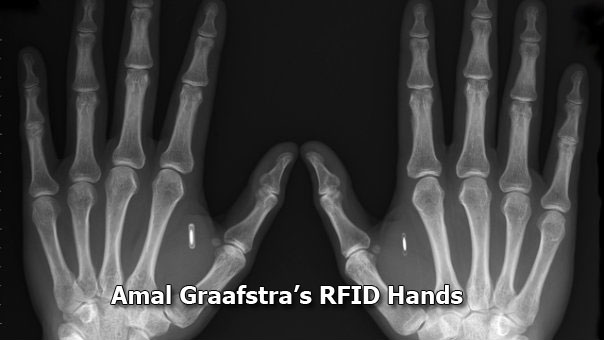For a number of years, SCDigest has reported on the phenomenon of humans implanting RFID chips, usually in the fleshy part of the hand between the thumb and the forefinger and used to automate various common tasks.
Supply Chain Digest Says... |
 |
| There's a good chance that, within a few years, RFID implants will be as common as back-pocket cell phones but, for now, they're still a novelty. |
 |
What do you say? |
| Click here to send us your comments |
 |
| Click here to see reader feedback |
|
|
In 2010, SCDigest reported on a man named Amal Graafstra, a West coast technologist who had RFID chips implanted in each hand, which he used to do things like open his garage door and turn on the lights and his computer with a simple wave of one of his hands.
It's not clear who was the first person to implant a chip.
According to a blog post by Erik Gibbs on the CalvinAyre.com web site, the first human to receive an RFID chip "for fun" was Kevin Warwick, a British scientist who volunteered to have one of the micro devices implanted under his skin 22 years ago. He used chip for the same class of tasks Graafstra used his chips for. That would put Warkwick's implant to be around 2008.
But Graafstra says he first took a chip implant in 2005.
Getting RFID implants is in fact a small but growing trend. Often, implants are categorized as a form of either "bio-hacking" or "trans-humanism." Graafstra himself started a company and web site called DangerousThings.com, through which he sells implant kits, the most popular, the site says, costing $169.00.
In 2015 came news that an office building complex in Sweden built a system that would allow workers in the building to use their implanted RFID chips to gain access through security doors, use services such as copy machines, pay for lunch and more, all without PIN codes or swiping cards, again with the wave of an RFID-enabled hand.
No news on whether that voluntary program is still active.
However, Sweden has become a hotspot for RFID implants, with over 4,000 Swedes now able to control doors and more using the rice-grain sized chips.
In his blog, Gibbs writes that "whether RFID chips should be implanted in humans raises a myriad of questions and, like any topic, has caused a great divide on their merits, as well as more than a few conspiracy theories."
(See More Below)
|
CATEGORY SPONSOR: SOFTEON |
|
|
| |
|
|
Gibbs sites some merits from getting chip implants. For example, he notes they can be configured to perform a number of different functions, including serving as a wallet. RFID technology, of course, is already used in most credit and debit cards today, but "having an RFID implant is more secure and makes a wallet virtually impossible to steal," he notes.

He also says that everyone generally has to carry around a physical ID outside the home - an implanted chip might eliminate what requirements.
An implanted chip could also carry a person's medical history, which could be accessed in case of a medical emergency.
But there is also opposition to bio-hacking. Some, for example, believe the tags could be used to allow governments to track the movements of citizens, or for providers of the technology to sell users' personal data to third parties.
However, Gibbs noes, "the functional distance of the chip's signal is extremely limited, making it impossible to track on a large scale."
He also say cell phones and other technologies already provide a path for governments or others to track people if they want.
"Being implanted with an RFID chip comes down to personal preference and whether the individual feels comfortable enough with the technology to embrace it," Gibbs concludes adding "There's a good chance that, within a few years, they will be as common as back-pocket cell phones but, for now, they're still a novelty."
Do you think we will see big growth with RFID implants? Let us know your thoughts at the Feedback button below.
Your Comments/Feedback
|